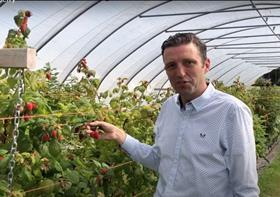
Global raspberry plantings have almost doubled from 1990 to the present day and are currently estimated at 125,000 hectares.
A large proportion of this area is in the processed product such as canning, desserts and juices. Fresh production accounts for approximately 30 per cent of the total hectarage, but significantly more in terms of tonnes produced.
Plantations for the processing industry tend to be on a larger scale with more traditional extensive production methods employed. Today’s fresh raspberry industry is almost all under protected cropping structures, with much grown in high-density, intensive growing systems.
Key elements of these intensive systems, in addition to the protected cropping structures, include the use of high quality, potted long cane plants. This type of plant material allows high yields of excellent quality fruit to be harvested around 90 days from planting.
Substrate production also significantly reduces the risk of disease in the crop, particularly soil-borne pathogens. Furthermore, the use of double-cropping primocane varieties means that two crops can be harvested from the same plantation per year.
At Global Plant Genetics, we work closely with the raspberry breeding programme at James Hutton. In the recent past, we have brought to market four new varieties that in combination, offer great quality and high yields over a prolonged harvesting window.
The Skye raspberry variety is a true double-cropping, primocane type that yields heavily in both the spring and autumn crops. Fruit quality in terms of size, shelf-life, colour and flavour are industry-leading. In addition, it's low-chilling nature means that it can be grown in a range of climates.
Lewis or Bonnie Lewis as it is known in the US is a true primocane type that yields early in the primocane season, dovetailing nicely with Skye in that picking window. It also has excellent fruit quality with outstanding flavour and really good shelf-life.
Lewis can also be double-cropped, and it is in its floricane harvest where Brix levels have been recorded at 14 per cent.
Glen Mor is a low-chill floricane type that also has the distinction of bearing tip-fruit late in the primocane season. This variety is the first one to be released from the breeding programme with the genetic marker are Rub118b, conferring resistance to raspberry root rot, Phytophthora Rubi.
In addition, the variety has an early cropping season and excellent fruit quality, including size, colour, shape, shelf-life and flavour.
Glen Carron is the fourth raspberry from this programme represented by Global Plant Genetics. It is a high-chill floricane variety that is particularly suited to long cane production methods. It crops early in the summer season and has outstanding fruit yields. Further, fruit quality is excellent and Glen Carron consistently ranked among the best in taste panels.
Raspberry breeding has developed significantly over the past decade and it is now expected for any new release to be able to withstand the rigours of the modern day supply chain.
This means that shelf-life is almost unrecognisable from popular varieties at the turn of the century.
Where next for raspberry breeding in terms of fruit quality? Now that consumers expect and generally receive a consistently good quality product on retailers’ shelves, one area that could be explored further is that of flavour.
Raspberry flavour can be a divisive subject. Traditionalists often prefer some bite and acidity in their raspberries and we certainly taste less of this with some modern day varieties.
The younger palate might prefer sweeter berries, as with other crops and foodstuffs. What is for sure is that modern breeding techniques will enable the development of both or either much more rapidly than in the past.
Genetic markers, such as those in the Glen Mor cultivar, could be developed for a whole range of other traits in new raspberry varieties. We expect them to become much more important in the raspberry breeding of the future.
New markers in terms of fruit size, shelf-life, yield metrics and indeed, flavour could all be developed in the near future. This would mean that better varieties in all of these aspects could be developed much more rapidly than by employing traditional breeding techniques.
At Global Plant Genetics, we will continue to work hard to be at the forefront of raspberry varietal development, so stay close to us for the latest raspberry news.



